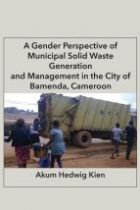


A Gender Perspective of Municipal Solid Waste Generation and Management in the City of Bamenda, Cameroon highlights the importance of recognizing and mainstreaming gender perspectives into municipal waste policies and strategies to achieve efficient waste management. It argues that although waste generation and management are influenced by gender politics and gendered divisions of labour, particularly at the household level, this relationship does not factor into Bamenda’s current municipal waste system. Its policies and strategies tend to focus on waste collection, transportation and, to a limited extent, disposal.
The failure of Bamenda’s municipal waste management system is commonly attributed to the lack of funding, technology, planning and expertise. However, the book argues that the lack of attention to the differentiated roles of men, women and children in waste generation and management is another major barrier to efficient waste management. Specifically, the book demonstrates how women’s household workloads (including food preparation and domestic cleaning activities) position women as the main agents of waste generation and management.
The book is based upon the PhD thesis of the author, Akum Hedwig Kien, completed at the Department of Women and Gender Studies of the University of Buea, Cameroon. Kien’s study focused on 47,585 households and nine markets in Bamenda as two main sources of municipal solid waste. The book addresses the following research questions:
The book concludes with a series of recommendations to the Bamenda City Council. These include:
Book note prepared by Kate Goh